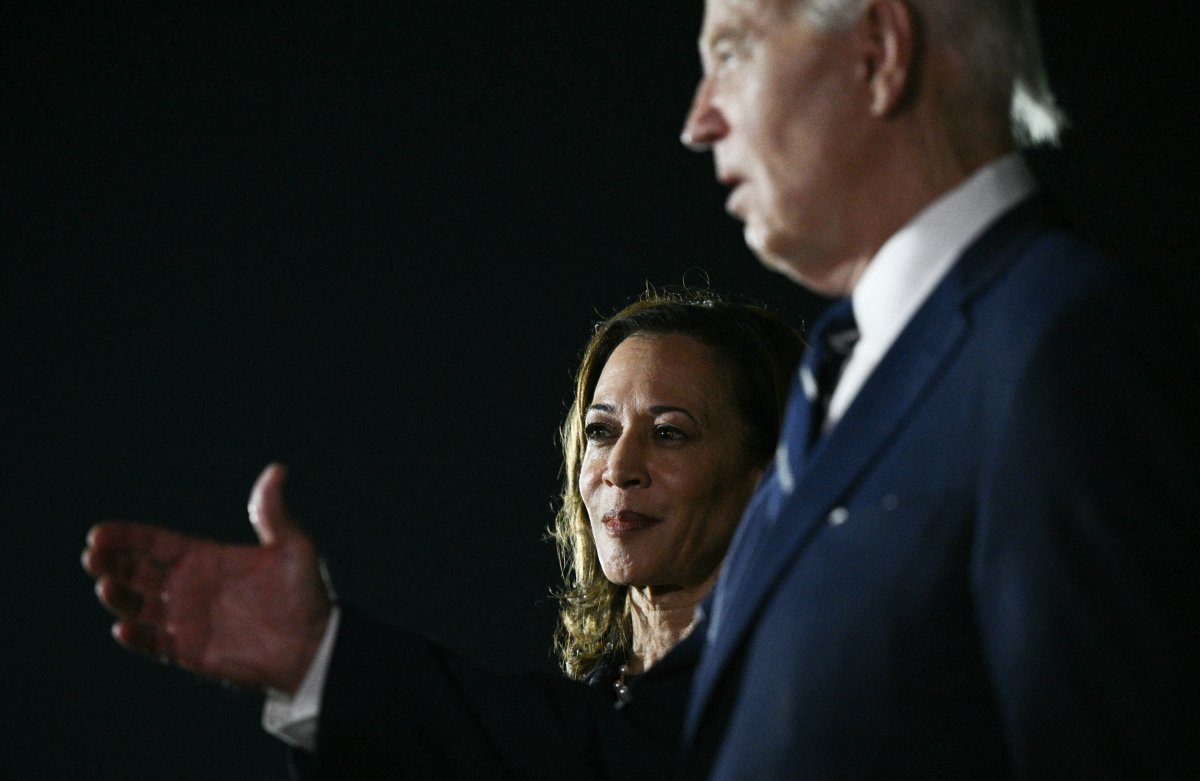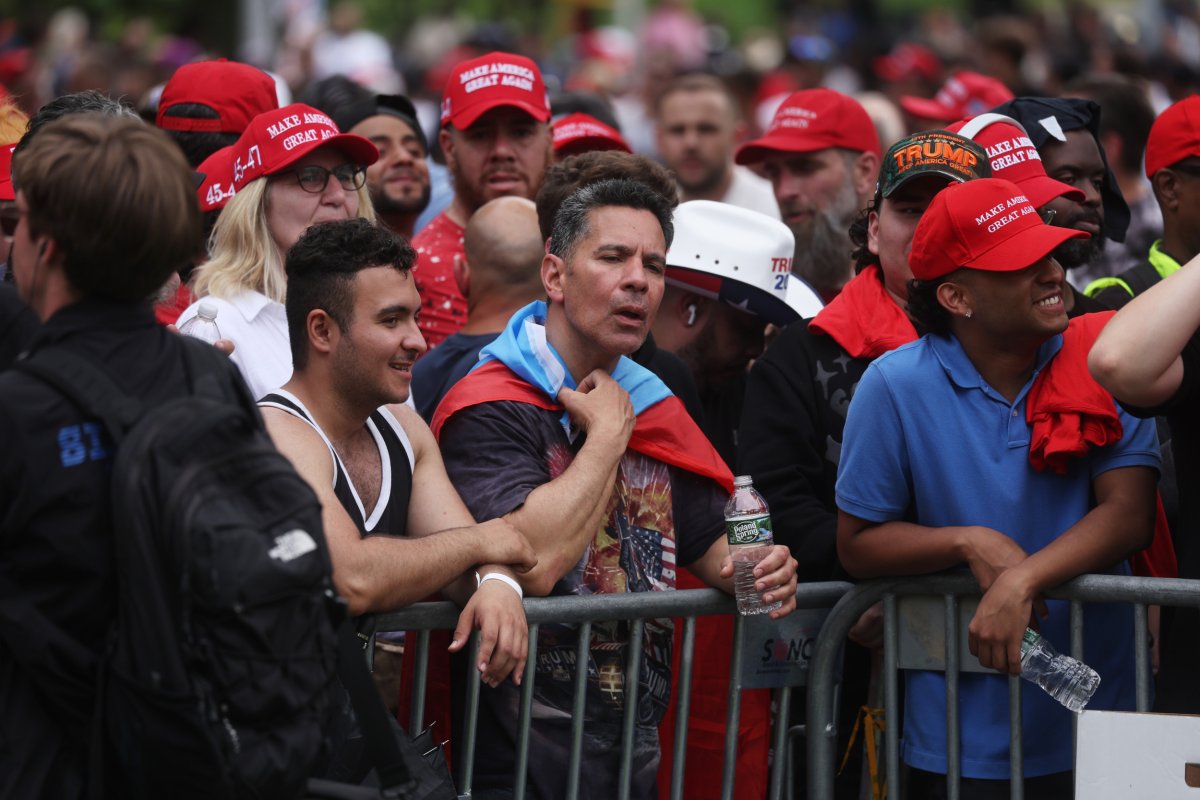Despite solid improvements in polling among Latino voters, Democratic presidential nominee Kamala Harris remains several points shy of the support President Joe Biden received from the voting bloc in swing states in 2020, according to a new poll.
Equis Research polling shows that, when adjusted to a two-way race, Republican nominee and former President Donald Trump is 4 points ahead of where he ended up in 2020 in 12 key states. The allocated two-way vote as of Equis’ August 14 poll has Harris at 60 percent and Trump at 40 percent. The Latinos in the poll who say they voted in 2020 said they favored Biden over Trump in that election, 64 percent 36 percent.
More than half the survey’s 2,183 respondents were registered in the key battleground states of Arizona, Georgia, North Carolina, Nevada, Michigan, Pennsylvania and Wisconsin. The full poll, conducted July 22-August 4, also included respondents from Colorado, Florida, New Mexico, Ohio and Texas.

Vice President Kamala Harris looks on as President Joe Biden talks to the media after the arrival of the prisoners released by Russia at Joint Base Andrews on August 1, 2024. Harris has surged among Latino voters since entering the White House race, but is still short of Biden’s numbers in 2020.
AFP/Getty Images
Despite trailing Biden’s 2020 numbers, the vice president has improved upon the president’s numbers from just two months ago in the same survey. The battleground poll shows Harris leading Trump, 56 percent to 37 percent among registered Hispanic voters in the seven most competitive states, which marks a large gain over the May 16-June 6, when Biden led Trump just 46 percent to 41 percent.
Biden has since exited the race and Harris has become the Democratic nominee.
The poll’s results vary by state.
Harris’ support in Wisconsin matches Biden’s in 2020, while the vice president is 5 points shy of the president’s support levels in Nevada in comparison to 2020. In Arizona, Harris is 2 points shy of Biden’s 2020 levels, according to Equis, which says it is “a set of organizations working to create a better understanding of Latinos, innovate new approaches to reach and engage them, and invest in the leadership and infrastructure for long-term change and increased engagement,” according to its website.
Newsweek emailed the Harris and Trump campaigns for comment Wednesday afternoon.
The Equis poll featured plenty of good news for the Harris campaign as it looks to retain and, to some extent, regain momentum in the key Democratic voting bloc. Equis called Harris’ entrance into the race a “reset” for many Latino voters.
The respondents who backed Harris by the 19-point margin only backed Biden by 8 points in the previous survey. Equis’ poll shows that Harris pulled nearly as much from Trump’s previous polling column as she did from previously uncommitted Latino voters.
Harris’ support among Latinos under 40 is 17 points higher than Biden’s was in June. She is at 60 percent with young Hispanic voters, compared to Biden’s 43 percent.
Women respondents backed Harris at 59 percent, up from the 50 percent backing for Biden in early June. Among men, the vice president saw a similarly increase, from 41 percent to 51 percent. Harris also leads among newly registered voters by 51 percent to Trump’s 35 percent, a six-point improvement over Biden.
“In important ways, this race has just begun,” Equis stated in its memo about the poll.
In a June Times/Siena poll, carried out by The New York Times and the Siena College Research Institute while Biden was still in the race, 45 percent of Hispanic people said they would vote for the Democratic president and 44 percent said Trump.
In the 2020 election, Trump received 32 percent of the Latino vote, a notable bump from the 28 percent he received in his 2016 victory.
His growing popularity among Latinos, as well as with other minority groups like Black Americans, is often cast as a surprise by his critics given his past rhetoric about Mexican migrants. He infamously used the words “rapists” and “criminals” to describe people illegally coming into the U.S. through its southern border in 2015.
However, Bob Unanue, the Hispanic Leadership Coalition chairman for the America First Policy Institute told the Associated Press that Trump—not Harris—shows commitment to the Hispanic community by highlighting issues such as job growth, education freedom, parental rights and securing the border.
“Unlike Kamala Harris, who has failed to address the crisis at our southern border … and continues promoting failed economic policies, Trump offers a vision of prosperity and safety that many Hispanic voters are rallying behind,” Unanue told AP.

People gather for an election rally for former President Donald Trump in Crotona Park in the South Bronx on May 23, 2024, in New York City. The Bronx borough, home to a large Latino community, has been a Democratic voter base for generations and the rally comes as Trump looks to attract more nonwhite voters.
AFP/Getty Images
Over the last eight years, the number of Latinos eligible to vote in the United States rose by nine million, faster than any demographic. Hispanics counted for a staggering 91 percent of the country’s population growth since the pandemic, according to a recent Brookings Institute analysis of Census data.
Hispanics now make up around 13.8 percent of the voting population in the U.S. overall. In Arizona, that number is closer to 25 percent, and in Texas it’s around 30 percent.
“Forty percent of the gain in the eligible voter population nationally is due to Latinos, so they are going to count, especially in place like Nevada and Arizona,” William Frey, who authored the Brookings study, recently told Newsweek.
Frey said that Harris becoming the Democratic candidate—and the first female of color presidential candidate—could also have an impact when it comes to Latina voters and other women of color.
“Already we know women vote more than men, they turn out more than men, they vote more Democratic more than men do,” he explained, saying that Harris could bring more votes from Latina women than Biden could have for the Democrats.
This week, The League of United Latin American Citizens (LULAC), the country’s oldest and largest Latino civil rights organization, endorsed Harris, the first time in the group’s nearly 100-year history that it has thrown its formal backing behind a presidential candidate.





